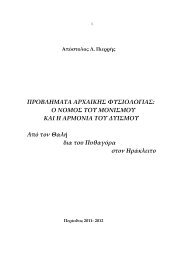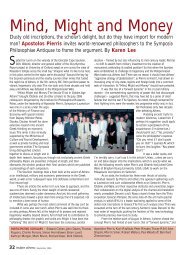16[36] it may be. Now <strong>the</strong> def inite determinateness (however abstract) <strong>of</strong> a c<strong>on</strong>tentimplies its being “set against” o<strong>the</strong>r c<strong>on</strong>tents equally determinate (though, maybe,more or less abstract), just as its self-identity as that determinate c<strong>on</strong>tent which it is,is <strong>the</strong> o<strong>the</strong>r side <strong>of</strong> its oth erness from o<strong>the</strong>r c<strong>on</strong>tents. Thus, evidently,determinateness (alike in c<strong>on</strong>tents and in c<strong>on</strong>cepts“intending” c<strong>on</strong>tents)presupposes a multiplicity <strong>on</strong>e <strong>of</strong> whose members <strong>the</strong> particular determinateness inquesti<strong>on</strong> is. C<strong>on</strong>sequently, every proper c<strong>on</strong>cepti<strong>on</strong> c<strong>on</strong>ce ives τὶ τῶν πάντων, as D.says, since it c<strong>on</strong>ceives a determinate c<strong>on</strong>tent, which, just in virtue <strong>of</strong> its bearing(and c<strong>on</strong>sisting in) a definite determinateness, c<strong>on</strong>trasts itself to, ultimately, everyo<strong>the</strong>r <strong>on</strong>tologically available (= subsisting) c<strong>on</strong>tent.But if this is our mind ’s proper way <strong>of</strong> c<strong>on</strong>ceiving, we can attain to somethinghigher, something <strong>of</strong> <strong>the</strong> nature <strong>of</strong> a principle, by striving towards a διακάθαρσις <strong>of</strong>our c<strong>on</strong>cepti<strong>on</strong>s. This “thorough purificati<strong>on</strong>” c<strong>on</strong>sists in trying to lay aside preciselythat afo rementi<strong>on</strong>ed definite determinateness which goes toge<strong>the</strong>r with <strong>the</strong>c<strong>on</strong>ceived c<strong>on</strong>tent’s being <strong>on</strong>e out <strong>of</strong> many (co-ordinated in some way or o<strong>the</strong>r)c<strong>on</strong>tents. This “purging” from our c<strong>on</strong>cepti<strong>on</strong>s <strong>of</strong> <strong>the</strong> μερισμός, <strong>of</strong> <strong>the</strong> divisi<strong>on</strong> intoparts, which is implicit in our normal understanding <strong>of</strong> determinateness (and <strong>of</strong> <strong>the</strong>realm <strong>of</strong> reality towards and to which this understanding attaches) leads toc<strong>on</strong>cepti<strong>on</strong>s [37] whose intended c<strong>on</strong>tent (if we may speak <strong>of</strong> “c<strong>on</strong>tents” here)covers <strong>the</strong> entire field <strong>of</strong> what was apprehended before <strong>the</strong> κάθαρσις aspartiti<strong>on</strong>ed and divided up into <strong>the</strong> various determinate c<strong>on</strong>tents. Not, <strong>of</strong> course,that <strong>the</strong> new, purified c<strong>on</strong>cepti<strong>on</strong>s (and <strong>the</strong> realities corresp<strong>on</strong>ding to <strong>the</strong>m) areabsolutely indeterminate; in fact <strong>the</strong> very plural used in indicating <strong>the</strong>m implies that<strong>the</strong>y are distinguished <strong>on</strong>e from ano<strong>the</strong>r and <strong>the</strong>re cannot be distincti<strong>on</strong> in <strong>the</strong> totallyindeterminate; it is ra<strong>the</strong>r that <strong>the</strong>y are not distinguished, and not determinate, in <strong>the</strong>fashi<strong>on</strong> <strong>of</strong> <strong>the</strong> former <strong>on</strong>es, not, that is, as a part <strong>of</strong> a whole is c<strong>on</strong>trast ed to, anddistinguished from, ano<strong>the</strong>r part <strong>of</strong> it, but as <strong>on</strong>e and <strong>the</strong> same whole (i.e. <strong>the</strong> totality<strong>of</strong> everything) is distinguished in accordance with various modes and characters <strong>of</strong> itssubsistence. But it is premature at this stage to insist fur<strong>the</strong>r <strong>on</strong> this point.The validity <strong>of</strong> <strong>the</strong> above interpretati<strong>on</strong> <strong>of</strong> purificati<strong>on</strong> (διακαθαίρειν) as appliedto reas<strong>on</strong>ed philosophy is born out, for example by D. ’s remarks <strong>on</strong> 275.8, 276.9-12.[37a]
17The highest point which this process <strong>of</strong> purificati<strong>on</strong> can reach is <strong>the</strong> On e – <strong>the</strong>simplest subsisting reality, which still (and that was essential in <strong>the</strong> process) coverseverything (and hence is, after a fashi<strong>on</strong>, everything), exhausts <strong>the</strong> field <strong>of</strong> bothbeing and n<strong>on</strong>-being [38]. For i t is, as we shall see, not <strong>the</strong> One itself but moreappropriately specifically and immediately <strong>the</strong> ἡνωμένον (that is <strong>the</strong> third FirstPrinciple, counting from <strong>the</strong> One as <strong>the</strong> first, since <strong>the</strong> absolutely ineffable UltimateGround must be properly left out <strong>of</strong> <strong>the</strong> counting) which is <strong>the</strong> proper principle <strong>of</strong>being; but in <strong>the</strong> abstract noti<strong>on</strong> <strong>of</strong> πολλά, n<strong>on</strong>-bein g is also included al<strong>on</strong>g withbeing, since a n<strong>on</strong>-being is equally “some-<strong>on</strong>e-thing”.D. c<strong>on</strong>nects <strong>the</strong> all-inclusiveness (<strong>of</strong> n<strong>on</strong>-being as well as <strong>of</strong> being) <strong>of</strong> <strong>the</strong> Onewith its absolute simplicity (τῶν δὲ πολλῶν ἁπλῶς, τὸ ἕν (sc. ἔσχατον)· τοῦ γὰρ ἑνὸςἁπλούστερον οὐδὲν ἔχομεν ἐννοεῖν, τοῦ πάντη ἑνὸς καὶ μόνον ἑνὸς etc.). See 60.5: διὰ τοῦτο γὰρ ἁπλούστατον (sc. τὸ ἕν), ὅτι περιεκτικώτατον. And <strong>the</strong>re is a deep lyingmetaphysical reas<strong>on</strong> for this c<strong>on</strong>necti<strong>on</strong>. Suppose X is <strong>the</strong> [39] absolutely simplereality; <strong>the</strong>n i t must be all-inclusive. For suppose that it is not; <strong>the</strong>n <strong>the</strong>re is“something” which is not X; let it be y. Ei<strong>the</strong>r X and y have something in comm<strong>on</strong>, z,or not; if <strong>the</strong> f οrmer, <strong>the</strong>n X is complex, being a certain modificati<strong>on</strong> or qualificati<strong>on</strong><strong>of</strong> z, ano<strong>the</strong>r be ing <strong>the</strong> y; if <strong>the</strong> latter, reality cannot be derived in its totality from asingle ultimate principle, which is <strong>the</strong> negati<strong>on</strong> <strong>of</strong> metaphysical m<strong>on</strong>ism, and, in <strong>the</strong>last analysis, <strong>the</strong> negati<strong>on</strong> <strong>of</strong> <strong>the</strong> interc<strong>on</strong>nectedness <strong>of</strong> all reality [40]. Andc<strong>on</strong>versely, suppo se that X is all-inclusive; <strong>the</strong>n it must be absolutely simple. Forsuppose that it is not; <strong>the</strong>n we can distinguish in it at least two, say, “notes” orcharacters Y, Z; obviously, <strong>the</strong>n, <strong>the</strong>re can be Z-things which are not Y (and viceversa), and <strong>the</strong>se would not properly fall under X; if it is objected that Y and Z maybe necessarily c<strong>on</strong>nected so that nothing can be <strong>the</strong> <strong>on</strong>e which is not <strong>the</strong> o<strong>the</strong>r aswell (and that, in fact, at <strong>the</strong> level <strong>of</strong> abstracti<strong>on</strong> <strong>on</strong> which we move, we shouldexpect that this is so), <strong>the</strong>n we reply that in such a case we should ask for <strong>the</strong>ground <strong>of</strong> <strong>the</strong> necessity <strong>of</strong> that c<strong>on</strong>necti<strong>on</strong> (since philosophy is nothing if not <strong>the</strong>earnest and devoted search for Ultimate explanati<strong>on</strong>s); and <strong>the</strong>n that Ground wouldbe <strong>the</strong> really ultimate principle, not <strong>the</strong> X as it was supposed.4.17-18. A textual difficulty is presented by <strong>the</strong> occurrence <strong>of</strong> καὶ in 4.18before κατὰ. The reading and punctuati<strong>on</strong> <strong>of</strong> A (comma after μόνον) give <strong>the</strong>following sense (retaining <strong>the</strong> καὶ): “it is <strong>on</strong>ly <strong>the</strong>re (in <strong>the</strong> One) that <strong>the</strong>se ar e to be
- Page 2 and 3: 2GENERAL REMARKThe first section is
- Page 4 and 5: 4Four reasons are, in aporematic fa
- Page 6 and 7: 6ὐθύς, i.e. without any prior
- Page 8 and 9: 8ἀμερές). Thus nothing is mi
- Page 10 and 11: 10separate them. Basically, as Aris
- Page 12 and 13: 12produced by, it; the principle in
- Page 14 and 15: 14the fashion of its one-ness, i.e.
- Page 18 and 19: 18found, and (there found) in accor
- Page 20 and 21: 20in its elf (apart from the orderi
- Page 22 and 23: 22something whose immediate product
- Page 24 and 25: 24clearer, as the system is further
- Page 26 and 27: 26ἡνωμένον, which generate
- Page 28 and 29: 28We find in this here a good insta
- Page 30 and 31: 30fully see his point, and to take,
- Page 32 and 33: 32NOTES[1] Not quite “given” th
- Page 34 and 35: 34forget that, for the time being,
- Page 36 and 37: 36[28] The interpretation given to
- Page 38 and 39: 38[39] It can be shown that there c
- Page 40 and 41: 40being immersed in it, handling it










